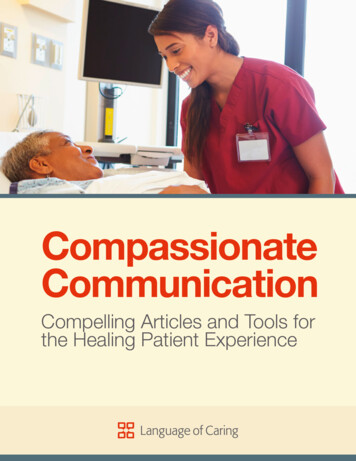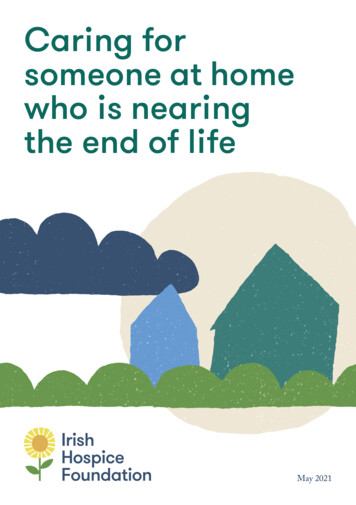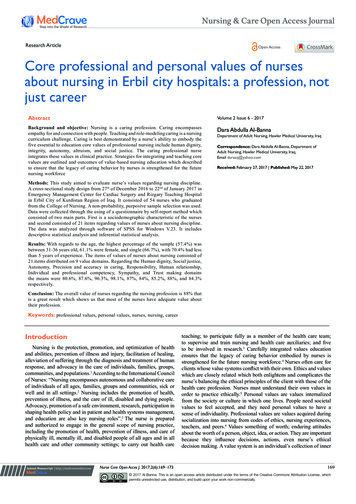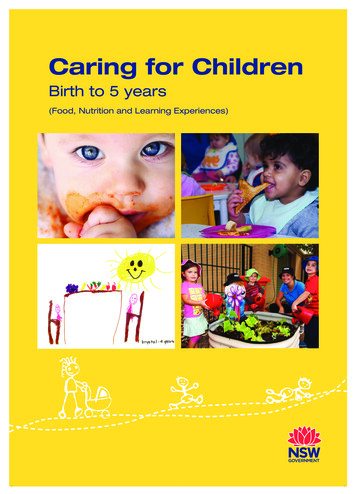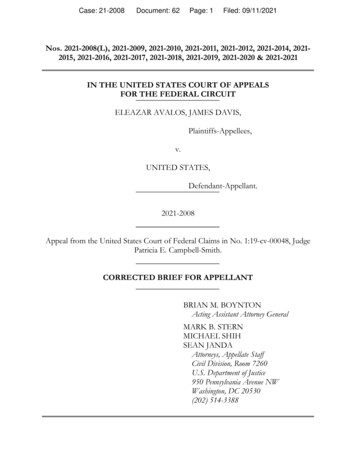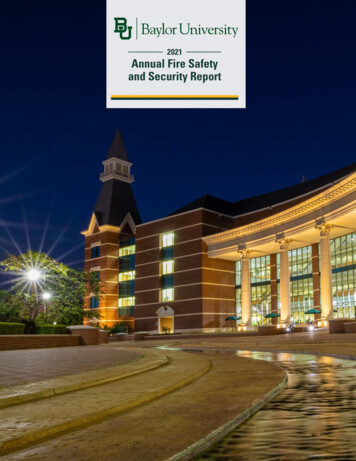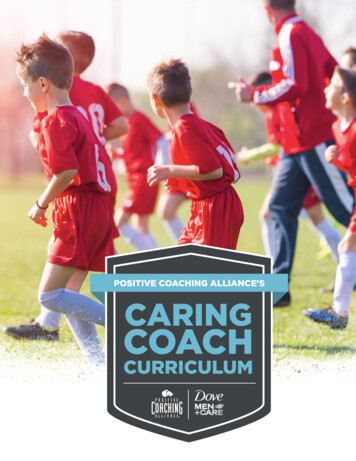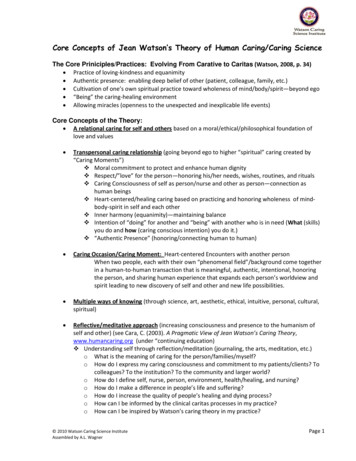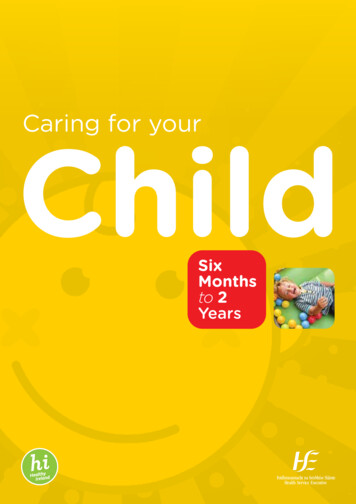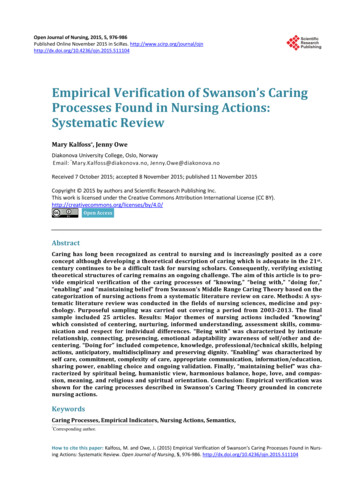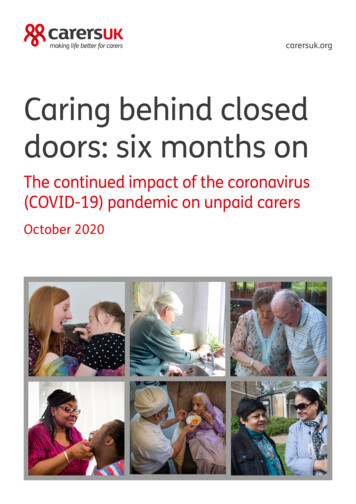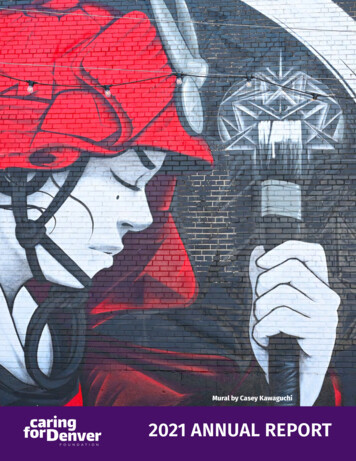
Transcription
Mural by Casey Kawaguchi2021 ANNUAL REPORT
CO N T E NTSA Letter toOur CommunityIssue Spotlight:Homelessness2021 StrategicPlan ProgressOur Approach &Shared Impact PlanProgress & ImpactWho We Are34578910122021OnlineCaring for Denver FoundationKey Facts2021 SnapshotOur ReachGrants ListAppendix: GranteeBoard Lists2021 Annual Report 2
A LETTE R TO O U R CO M MU N I TYT H IS ISYO U R S TORY.The people of Denverrecognized that by tappinginto our creative power andingenuity, we can realizehealthier communities, anda city truly committed to thewellbeing of every resident.In response, Denver foundedCaring for Denver to createa new and groundbreakingapproach to meeting the City’smental health and substancemisuse needs.Our 2021 annual reporthighlights the achievementsand triumphs possiblethrough community activation.After just two years ofoperation, Caring for Denverhas deployed more than 59 million in grants to 163organizations committedimproving mental health andsubstance misuse in our city.Through this commitmentof resources, the peopleof Denver gave individualsin crisis connections totrauma-informed care, peerswith lived experience, casemanagement, more accessto mental health services,and linkages to communityrecovery resources.The people of Denvergave support to unhousedindividuals—and those atrisk of becoming unhoused—struggling with mental healthand substance misuse needsduring a global pandemic.The people of Denver openedthe door to communityinformed care that aligns withcultural values and traditions.The stories told in thisannual report confirm thatthe people of Denver hadit right. Creating a unique,dedicated resource committedto transformational care isyielding powerful change inour communities.The first wave of reporting forgrantees who have completedat least 12 months of theirwork is already demonstrating 83% reported improvedor maintained mentalhealth 86% did not re-enter thecriminal justice systemAnd we’re just getting started.The optimism of our board,our staff, grantees, keystakeholders, and city leadersis inspiring. In the face ofchallenging times, a pathto healthier communities inDenver is clearly emerging.We thank you—the peopleof Denver—for your wisdomand trust. We will matchyour commitment, seekyour guidance, and honorour partnership as we moveforward together.In Gratitude,Lorez MeinholdExecutive DirectorCaring for Denver Foundationimportant progress. Of grantparticipants assessed forimpacts: 70% demonstratedor reported reducedsubstance misuseLeslie HerodState RepresentativeBoard Chair2021 Annual Report 3
Key FactsFounded by and for Denverin 2019Independent, non-profitfoundation funded by salestax dollarsAddresses Denver'smental health & substancemisuse needsSin ce i ts in ce p t ion , Car in g fo r D e nve r Fo und a t i o n ha s a pp rove d 238gra n ts to 1 63 u n iqu e organ iza t i o ns to tali ng m o re t ha n 59.6 m i ll i o n.ValuesRESPECT. ALWAYS.We fiercely embrace inclusion and diversity,and strive to be representative, culturallyresponsive, and linguistically appropriate in allthat we do.BE COURAGEOUS IN ACTION.We champion candid, open-minded reflectionand are thoughtful and bold in the action wetake.MEET PEOPLE WHERE THEY ARE.We see and support all people and communitiesfor their strengths and inherent value.PurposeFOCUS ON IMPACT FOR COMMUNITIES.We center all of our work on outcomes thatalways put Denverites, and their potential, first.ADVOCATE OUT LOUD.We courageously share our stories, engage ourcommunities, and demonstrate how mentalhealth and substance misuse affects us all.INVITE PARTNERSHIP.We are partners with the grantees, communities,and individuals with whom we collaborateand serve, recognizing all are essential toidentifying, defining, and deciding what theyneed.Caring for Denver was created by City ordinance to fund the following purposes: Mental health services and treatment forchildren and adults Opioid and substance misuse prevention,treatment, and recovery programs Housing and case management servicesto reduce homelessness, improve longterm recovery, and reduce the costly useof jails and emergency rooms for thosewith mental health and substance misuseneeds Suicide prevention programs Co-responder and alternative responseprogram funding, and training on how toproperly assess and handle people withmental health and/or substance misuseneedsThese purposes are addressed through four community-identified, Board-approved funding priorities:Alternatives to Jail, Care Provision, Community-Centered Solutions, and Youth.Caring for Denver Foundation2021 Annual Report 4
2 0 2 1 SN A P S H O T 5.53 LLIONMI 8,603,592Alternatives to Jail 4,267,056Care ovativeBuilding capacity andresponding to emergingneeds in our communities.5%10%67%2021 AVAIALTERNATIVESTO JAIL 29,445,284YOUTHRS17%2021OperatingOperatingCity nts 35,515,000AWPersonnelPersonnelYouthCare for Denver’syouth, to reducecrisis and increaseresilience for copingwith life stressorsThis funding has allowed us to support many heartsand souls in such an essential time, which in turn,creates hope, and with hope, we can see the future.- Life-Line Colorado67%17% 10,818,452Community-based carethat prioritizes culturalrelevance, and communitycollaborationE GRANT DOLBLLALAADMINISTRATIVE EXPENSESWe spend no more than 5%of sales tax revenueson5%6%administration,detailed below.6%grants since ourfounding in 2019 9,790,073 2,035,82710%1,s in ueto 131 uAccess to care thatreflects, represents,and values uniquecultures and needsCare for individualswho might otherwisebe entering or re-entering the criminaljustice system 59.6MillionG R A NT D O LLARExpenseCityAdministrativeExpense* This includes carryover funds from the previous year.Caring for Denver Foundation2021 Annual Report 5
Factors for GrantSelectionCaring for Denver prioritizesprograms and/or servicesthat: Align with Caring forDenver’s mission andfounding Ordinance Provide increased accessto and use of supportsthat improve mentalhealth and substancemisuse challenges Engage the people beingserved as partners in thework Reach communities whohave been impacted bytrauma and inequitableaccess to resources andsupports Are meaningful to thecommunity, where theyare, and in the formsthat work for them Engage more individualsin ongoing support thatstays aligned with theirneeds, even as needschange Are driven by entitiesthat are the ‘right’ fitgiven the communitycontext, shown throughpartnerships, credibility,and trustMural by Jaime MolinaCaring for Denver Foundation2021 Annual Report 6
OUR R E A C HighlandBearValleyHarvey ParkSouthCountryClubedaleDenverites using services and supportsfunded by Caring for DenverVirginiaVillageIndian 4HampdenKennedy4HampdenSouthSince 2019, we've funded organizations that serve every City Council District and neighborhoodin Denver. Additionally, we funded organizations that specifically serve areas of higher need (asindicated by darker purple).Caring for Denver FoundationA NDParkMarstonRos6 6CoryMerrill45grants reportingin 2021 on 1 yearof oFort LoganPlattPark10238grants awardedsince inceptionEastColfax55thSou2College View –South PlatteOverlandRuby HillHarvey ParkCapitolHillSun ValleyBarnumBarnumWestMar LeeierAthmar ParkWashParkWestHilltopGateway-Green Valley Ranch8SpeerCherryCreek11Central ParkSkyland North Park HillthitWestwood7NortheastPark HillCityCityParkSouth Park HillParkWestMoCheesntcCongressmanlairHalePark ParkcCivi nterCe3BakerWU Five PointsJefferson StaniontioSloan Lake ParknNorthAuraria CBD CapitolHillWest ColfaxLincolnParkVilla ParkValverdeClaytonColeWashington sityHillsChaffee ParkUniversityRegis66,325people contactedthrough grantee outreach.2021 Annual Report 7
ISSUE SPOTL IG H T : H O MELES SNESSIt is critical to acknowledge and address the complex needsof people experiencing homelessness, or on the verge of it, sothey can recover and thrive.Chronic homelessness is an important issue for our City andState. We are addressing homelessness in three distinct ways:Funding organizations and ideas that promote stability andprevent homelessness. Several grantees assist men and womencoming out of incarceration, serve foster youth, or provideculturally affirming care for historically marginalized populations— all of whom are at higher risk of becoming unhoused.Bringing mental health and substance misuse care to peopleexperiencing homelessness. We support organizations providingcare and connection to services at transitional housing settingslike day shelters and Safe Outdoor Spaces, and through mobilevehicles. We also invest in critical self-care and hazard pay forstaff providing services to the unhoused.Making recovery and stability more likely. We fund casemanagement services to help unhoused individuals connect tocare. We prioritize and invest in peer support programs, a provenstrategy to improve outcomes by providing care navigation frompeople who have lived through similar experiences.The stability of our unhoused neighbors also relies on otherequally important factors – the right housing, financial security,physical health and other social supports, and employment.Caring for Denver collaborates with several prominentorganizations on the front lines of addressing these needs,including: Department of Housing Stability (HOST) – the lead Denvercity agency addressing homelessness through housing andcrisis services Denver Homeless Leadership Council – executives of someof the metro area’s largest homeless service providers Metro Denver Homelessness Initiative – a regional coalitionof nonprofit organizations, governments and otherstakeholdersA list of Caring for Denver grantees that includes those whoprovide services to reduce homelessness is included at the endof this report. Learn more: https://bit.ly/C4Dresponsive.Caring for Denver FoundationPhoto courtesy ofColorado Village CollaborativePeople in the communityrecognized the bigundertaking we wereinvolved with [.] andhow critical it was to stayopen for those withoutany other place to go. Youhelped us do that — myappreciation is deep forthat insightfulness andcaring.- St. Francis Center 16.2millionin funding for 66 grants(since founding in 2019)that support unhousedcommunity members andtransitional housing spaces.2021 Annual Report 8
2 0 2 1 STR ATEG I C P LAN PR O G R E SSIn 2021, we continued building a trusted, effective, and sustainable organization in alignmentwith the goals in our strategic plan. This section highlights some of the ways we advanced ourorganizational priorities in 2021.COMMUNITY AUTHORED AND DRIVEN We engaged more than 90 individuals, those in the workand those with lived experience, as community thoughtpartners. Staff participated in more than 180 events andconversations in the community to share information, leador support collaborations, and build knowledge.90%of thought partnerssurveyed agreed thatpeople impacted byour work played ameaningful role in whatwe do.ESTABLISH ORGANIZATIONAL INTEGRITY &STEWARDSHIP We developed and implemented financial, organizational,and grant policies and practices that promote consistencyand reliability, establish trust and credibility, anddemonstrate organizational accountability. An independent certified public accounting firm conductedan audit of our 2020 and 2021 financial statements andinternal controls; there were no material recommendations.PROMOTE EQUITY We implemented three capacity building projectssupporting grantees with limited resources in buildingtheir capabilities to be high-performing, sustainableorganizations. These projects invested in building theresources and skills for 32 organizations to ensure theirprogrammatic success and sustainability in their mentalhealth and substance misuse work.DEMONSTRATE MEANINGFUL ACTION &LEARNING We worked with all grantees receiving a grant in 2021 todevelop project frameworks that define grant projectstrategies, intended changes, and measurement plans. We published two learning briefs that share granteestrategies, progress, and insights for impact with theDenver community (access them in the column to theright).2021 Learning Briefs Community-CenteredSolutions (October 2021) Alternatives to Jail (April2021) 45 grantees completed the first year of their grants byDecember 2021; data from these grantees are included inthis report (see page 12-page 19).Caring for Denver Foundation2021 Annual Report 9
OUR A P P R O A C HIn 2019 and 2020, we reviewed public data and engaged the Denver community to determineour funding priority areas. In 2021, we worked closely with grantees and community partners tounderstand the changes our community hopes to see across these funding priorities. Here's whatwe heard:To address Denver's mental health and substance misuse challenges,we must see changes in Access, Fit, and Care Over Time.INCLUSIVE ACCESS: Peopleneed access to care in waysthat make sense for them, inplaces that feel comfortable,and at times that fit theirschedules. Ideally this willbe a diverse network of careoptions, situated withincommunities, that allowpeople multiple entry pointsand a variety of ways toaddress their needs.ATTENTION TO FIT: Whenpeople seek care, they shouldfeel understood, connected,and respected by thoseproviding that care. Bettercultural matches betweenthose giving and receivingsupport can lead to higherquality interactions andengagement, and help reducestigma around mental healthand substance misuse.Caregivers also need supportfor maintaining their ownmental health and the skillsto engage in trauma-informedways. Healthy providers whofeel valued and supportedare more likely to stay in theirroles, provide quality care, andbuild trusted connections withthose they serve.CARE OVER TIME: Mentalhealth and substance misuseare life-long journeys thatoften don’t follow a single,linear path to wellness.People need to know andexperience care options thatare consistent, dependable,and flexible. These careoptions should also bemore collaborative and caretransitions more seamless tominimize the starts and stopsto care that require peopleto re-tell, re-live, and/or redocument their journeys.With these three systems changes identified, we dug deeper into the community's feedback andDenver's Road to Wellness framework to define signals that would show whether the Foundation’swork is on the right track. We created the Foundation’s Shared Impact Plan (page 11) using thisinformation and we are partnering with grantees to ensure they are measuring and reporting onthe changes that matter to the community.Caring for Denver Foundation2021 Annual Report 10
C H A N G I NGT H E CON V ER S AT IO N.We used what we learned to build a Shared Impact Planthat guides our work together.SH ARED IMPACT PLANThis Shared ImpactPlan, designed with thecommunity’s voice, isthe cornerstone of ourevaluation and learningapproach.We work closely withgrantees to lift up theSignals of Progress and/or impacts in their workand we support them inmeasuring these.Through this process,we build trust,invest in communityexpertise, and committo being good partnerswith those doing thework.Community-Defined ApproachFunding AreasChange NeededINCLUSIVE ACCESSSignals of Progress Increased engagement or retention in supports Increased connections for help and supportAlternatives to Jail Increased skills or awareness for addressingmental health and substance misuse issues Increased resilience and ability to cope withchallengesCare ProvisionATTENTION TO FIT Reduced disparities in engagement; use ofservices by those not typically seen or served Increased trust, satisfaction, comfort with careCommunity-CenteredSolutions Reduced stigma People providing care are able to stay engaged inrole and/or feel valued and supportedYouthReduce substancemisuse (includingmaintained healthyrelationship withsubstances)Improve or maintainmental health(including reducedharm to self and others)Increase equity inmental health andsubstance misuseoutcomesReduce entry orrecidivism into thecriminal justice systemfor those experiencingmental health andsubstance misusechallenges Increased options for crisis care and acute careneedsCARE OVER TIME Improved coordination, particularly across typesand levels of care Increased retention through transitions Stability over time for those engaged in servicesand supportsCaring for Denver FoundationShared ImpactGoalsShared Impact Plan2021 Annual Report 11
PRO G RESS & I M PA C TM E A SU R I NGWH AT M ATTER S .We need to becomfortable with adaptingan idea if it’s not whatpeople actually need orwant.- La Cocina1OWe support grantees in measuring what theyfeel is important based on the work they do.Our approach to data is different. We partner with grantees todetermine what to measure, so their metrics can be tied moreaccurately to their intervention. It helps us understand whatthe community sees as success and allows grantees to focuson collecting data that is meaningful for them, rather than theFoundation determining what data matters most.Each year, grantees provide updates on progress through twolearning calls and an end of grant year report. This gives usthe opportunity to celebrate wins and support grantees inadaptation when things aren’t going as intended. With thisapproach the data helps grantees do their best.By the end of 2021, 45 grantees reached the one year mark fortheir grant and completed their learning calls and reports. We’reexcited to share an overview of grantee Signals of Progress andreporting on Shared Impact Goals based on the Shared ImpactPlan (on the previous page).Key Data Takeaways2O3OOur investments in grantees are improvingDenverites' mental health and substance misuse.Those far enough along in their programs tomeasure progress on our Shared Impact Goals haveshown between 70% and 99% of participants aremeeting program targets.Grantees see reducing isolation as a keystrategy for addressing these challenges. 94% ofparticipants across 14 organizations have increasedand improved their connections to address mentalhealth and substance misuse needs.Early grantee efforts have mostly focused onincreasing access and improving the fit of services.We are continuing to look for opportunities toinvest in, and demonstrate progress on, care overtime changes. These often require more time andcollaboration as they focus on addressing largersystems-related challenges.Caring for Denver FoundationLEARN MOREInclusive access, attention tofit, and care over time can beaddressed in multiple waysto meet diverse communityneeds. Learn how some ofour grantees are approachingtheir work in our 2021Learning Briefs: Community-CenteredSolutions (October 2021) Alternatives to Jail (April2021)2021 Annual Report 12
PRO G RESS & I M PA C T : S H ARED I MPACT GOALSW E ' RE J US TG E T T I NG S TARTED.Shared ImpactGoalsportsrtngshvedcareaged inWe're helping grantees grow theircapacity to report on impact.All 45 grantees had rich data to report for Signals of Progress,and 21 were ready to report on our Shared Impact Goals.Reduce substancemisuse (includingmaintained healthyrelationship withsubstances)70%of 687 participants demonstrated or reported reducedsubstance use or a maintained healthy relationship withsubstances that met criteria of the program.Improve or maintainmental health(including reducedharm to self and others)83%of 113 participants reported improved or maintainedpositive mental health.99%of 215 participants met program criteria for not enteringthe justice system, either because of no charges leadingto incarceration during the grant period; or by completinga diversion program.86%of 891 participants did not return to the justice system.Increase equity inmental health andsubstance misuseoutcomesReduce entry orrecidivism into thecriminal justice systemfor those experiencingmental health andsubstance misusechallengese caretypesrvicesSERVICIOS DE LA RAZAShared Impact PlanCaring for Denver FoundationServicios provides culturally responsive behavioral healthtreatment and intervention services to Denverites before,during, and after criminal justice involvement. The programuses trauma-informed care, peer support, case management,and additional supports for employment, housing, and linkagesto community recovery resources. For this grant, Serviciosmonitored recidivism rates at 90 days and 180 days for clientsentering outpatient behavioral health treatment services. Of the71 participants, 96% remained in community at 180 days.2021 Annual Report 13
PRO G RESS & I M PA C T : S I GNA LS OF PR O GRESSTH IS IS W H ATC H A N G E L OOK S LIKE.All grantees are showing Signals ofProgress toward our impact goals.Mural by Santiago Jaramillo of D3 ArtsCHAN GE N EE DED : I N C LU S I VE ACCESSNumber of OrganizationsReporting for Each Signal8101214Percentage of Participants Assessed Who Met TheirOrganization's Criteria of Progress (with example criteria)Increased skills or awareness for addressing issues76%Client met treatment goals; participant increased resource awareness;provider increased knowledge/skillsIncreased connections for help & support94%Participant increased connections for support or reported reducedisolation; client engaged with referrals or peer supportsWe all have our own minicircles, communities,worlds.When yourcommunity is behind yourchoice it's more likely tostick.- Community MemberCaring for Denver FoundationIncreased engagement or retention69%Client completed program; Client attended voluntary programs; Participantre-enrolled as a peer or alumni supportIncreased resilience & ability to cope76%Client was observed or reported using skills learned; Participant utilized orcompleted recovery plan2021 Annual Report 14
PRO G RESS & I M PA C T : S I GNA LS OF PR O GRESSCOLORADO ARTIS TS I N RECOVERY (CAIR)Read CAIR's story.3xmore peer specialistsessions happened withclients in the second half ofthe grant year compared tothe first half.72%of participants who workedwith a peer specialist onsubstance misuse needsentered a recovery ortreatment program, enrolledin Medication AssistedTherapy (MAT), and/orreduced their substanceintake.Caring for Denver FoundationCAIR offers multi-week peerled creativity workshopsincluding art, music, andother creative activities forpeople seeking recovery.They encourage participantsto find a classmate to reachout to and build connectionsfor support during and afterthe workshops. Participantsalso share ongoing creativework and events on a privateFacebook page, stayingconnected to a largercommunity of support. CAIRuses post-class surveys toassess connections.88%of participants said they wereable to reach out to someonein the workshop to build asupportive network.95%of participants reported theworkshops helped them feelmore confident reachingout to others for recoverysupport.COLORADO VILLAGE COLLABORATIVE (CVC)CVC is a transformationalhousing community operatedin partnership with peopleexperiencing homelessness.They provide access toclinicians via tele-healthservices, peer supportsand mentoring to improveoutcomes, and grouptherapy that incorporatesart, music, and more.Peer support is a provenstrategy for fostering sharedunderstanding, respect, andmutual empowerment tohelp residents in the recoveryprocess.Watch CVC's story.2021 Annual Report 15
PRO G RESS & I M PA C T : S I GNA LS OF PR O GRESSCHAN GE N EE DED : ATTE NT I O N TO F ITNumber of OrganizationsReporting for Each Signal5365Percentage of Participants Assessed Who Met TheirOrganization's Criteria of Progress (with example criteria)Increased use of services by those not typically served42%First time engagements; Participants report cultural fit as why theyparticipate; engagement by underserved populationsIncreased trust, satisfaction, & comfort85%Reported sense of safety and/or connection to providers; Participantbelief that facilitators/ providers care about themWe need locally andculturally responsive careso people are truly ableto heal, whatever thatmeans to them.- Community MemberCaregivers feel valued and supported93%Caregiver satisfied with role and resources; staff with lived experience stayin positions for defined time periodsReduced stigma83%Increased conversation about mental health; reduced negative feelings orincreased positive beliefs for seeking helpVIVE WELLNESSViVe offers culturallyresponsive workshops,groups, trainings, andcoaching to support Latinomental health wellness. Viveused survey responses toassess their impact on stigma,connectedness, trust, andother signals of progress.Caring for Denver Foundation82%of participants agreedto the statement “thereis nothing wrong withsharing how I feel.”89%of participantsanswered yes to “I feltsafe and not judgedtalking about myproblems.”I learned for the firsttime in my life that it isok not to be ok and I canget help if I need it todeal with my emotions.-ViVe participant2021 Annual Report 16
PRO G RESS & I M PA C T : S I GNA LS OF PR O GRESSCENTER FOR AFRICAN AMERI CAN HEALTHCenter for African AmericanHealth is partnering withthe Therapist of ColorCollaborative to provideclinical therapeutic supportsto persons of color bytherapists of color. They trackreferrals and dates of service,and use intake assessmentsto better understand thosethey serve.95%of individuals referredsuccessfully completedtreatment or were stillengaged in treatment(typically 15-18 sessions).84%of participants had neverreceived behavioral or mentalhealth services prior.SU TEATRO CULTURAL & PERFORMING ARTS CENTERI think a lot of the folksthat showed up, you wouldthink they would have hadlots of opportunities toshare their stories, butthey hadn’t andthey were really hungryfor that opportunity.- Su Teatro95%of participants reporteda more open attitudetoward exploringmental health and agreater understandingthat mental healthchallenges areuniversal.Su Teatro uses theaterproductions and facilitatedcommunity dialogues toraise awareness about andprovide support to peopledealing with mental healthchallenges, substance misuse,and trauma. Su Teatro usedparticipatory researchmethods with participants toassess stigma reduction aswell as increased awarenessand increased connectedness.Crush Alley MuralCaring for Denver Foundation2021 Annual Report 17
PRO G RESS & I M PA C T : S I GNA LS OF PR O GRESSCH AN GE N EE DED : CARE OV E R TIMENumber of OrganizationsReporting for Each Signal0114Percentage of Participants Assessed Who Met TheirOrganization's Criteria of Progress (with example criteria)Stability over time for those engaged in services and supports85%Stable housing or employment during or after treatment; engaged inevents for sobriety; Improved self-sufficiency scoresIncreased options for crisis care and acute care needsIncreased availability for on-call crisis support; temporary supportsprovided for people on therapy waitlistsIncreased retention through transitionsAddressing care over timewill take time, and so willmeasuring these signals ofprogress.This change area has limiteddata for the first year asthese interventions oftenrequire more planning timeand investments in changingsystems.Engagement in treatment services after crisis care or criminal justicerelease; Use of sober housing after detoxImproved coordination across types & levels of careIndividuals served through co-located services; reduced wait times forreceiving care; increased referral partner optionsTRIBE RECOVERY HOMESTribe Recovery Homesprovides substance misuserecovery support toindividuals with criminaljustice involvement throughstructured, supervised livingspaces, peer coaching, clinicalcounseling, and employmentsupport. For those testingpositive for substance misuse,social detox and re-entry intorecovery homes are offeredwithout shame or belittlingthe relapse.Caring for Denver Foundation100%of clients were able to receivemental health and substancemisuse supports onsitethrough peer navigators andclinical therapists.92%of all client drug screensimplemented were negativefor drug use.We know that relapsemay be a part ofsomeone’s recovery. In asense it is like learning toride a bike. Sometimes youfall down.-Tribe Recovery Homes2021 Annual Report 18
PRO G RESS & I M PA C T : S I GNA LS OF PR O GRESSDENVER POLICE DEPARTMENT (DPD)97%of encounters didnot result in any criminaljustice action (such as ticketsor citations)99%of encounters didnot result in arrestThe DPD's Co-Responderprogram partners licensedmental health clinicians withpolice officers to respondto calls involving peoplewho suffer from mentalillness and/or co-occurringsubstance use issues. Theteams collaborate to providetreatment in a format thatbest decreases currentstressors and replaces themwith long-term communitybased supports.This work is in partnership with the Support Team AssistedResponse (STAR) program, which connects nonviolent 9-1-1 callswith a mobile unit that includes a mental health clinician anda paramedic. Based on our initial investment the program hasbeen expanded Citywide, with Caring for Denver matching theCity's investment of 1.4 million.P R O G RESS CON S I DE RATION S Sometimes even a small amount of measured progress can signal a large success,particularly for those in high-risk and highly complex situations. Grantees provide additionalcontext for determining the true value of the reported changes on Foundation learning calls. Just because it wasn't measured, doesn't mean it isn't happening. Grantees are oftenaddressing multiple signals and impacts, and we ask them to prioritize what they measureto reduce burden and allow them to focus on the work. We are workin
Online Board Lists Who We Are. Caring for Denver Foundation 2021 Annual Report 3 . Westwood Mar Lee Harvey Park Bear Valley Harvey Park South Fort Logan Marston Chaffee Park Sunnyside Highland Barnum Globeville Elyria-Swansea Cole Clayton hittier Five Points Auraria Lincoln Park Valverde Baker Athmar Park Ruby Hill College View - South .
